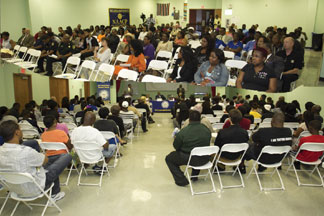

NAACP Trayvon Martin Town Hall Meeting
By Marie Carrie mcarrie305@gmail.com
On the eve of the George Zimmerman verdict, the citizens of Fort Lauderdale conducted a town hall meeting to discuss the Trayvon Martin trial.
The meeting was hosted by the Fort Lauderdale/Broward Branch of the NAACP and moderated by State Representative Perry Thurston, Jr. It took place at the Mizell Center on Sistrunk Blvd, Thursday, July 11.
The main meeting room on the second floor was packed with numerous individuals standing along the walls. Law enforcement, political representatives, judicial representatives and private citizens all came together to participate in the dialogue.
The panel consisted of Attorney Charles “Chuck” Morton (retired from the State Attorney’s Office); Attorney Kal Evans (currently with the State Attorney’s Office); Attorney Johnny McCray, Jr.; Attorney Howard Finkelstein (Broward County Public Defender); Assistant Chief of Operations Anthony Williams (Fort Lauder-dale Police Department).
After an opening prayer by Bobby Henry, publisher/owner of the Westside Gazette, Howard Finkelstein made the prophetic statement, “I just don’t see how any jury anywhere can convict on Murder 2.”
Finkelstein went on to say that the prosecution made the wrong charge hoping that the lesser included charge of man-slaughter would be proven beyond a reasonable doubt.
Morton elaborated on this matter by stating that the issue in fact goes beyond if it was properly charged to the fact of it was properly investigated. “When someone makes a charging decision, they make it on the basis of how the investigation began; from the very start and all the information that has been accumulated.”
In the case of George Zimmerman, the investigation began with some glaring misfires. For one, Mr. Zimmerman was not arrested on the night of the shooting. Secondly, Mr. Zimmerman was not examined by a medical professional on the night of the shooting.
In fact after declining transportation to a hospital for noticeable injuries to his face, Zimmerman was briefly questioned at the Sanford Police Department, given tissues and a bottle of water and released to return home with his wife.
Speaking on these events, Finkelstein said one thing that everyone in the audience readily agreed with. “Make no mistake about it; if it had been reversed Trayvon Martin would have been arrested that night.”
Attorney Johnny McCray Jr. backs up that claim with his, sentiments, “The decisions made early on in this case were racially motivated.”
Finkelstein and McCray allude to an issue that is at the heart of this trial: Race. But no mention of race was ever made in the trial’s proceedings. And yet every aspect of this case contained elements of race.
From George Zimmerman’s suspicions of Trayvon to Trayvon’s fears of Zimmerman to the police’s handling of the investigation, and finally even to the composition of the jury that ultimately decided Zimmerman’s (and by default Trayvon’s) fate.
Of the six jurors on the trial, not one was of African-American descent. In essence, an all white jury decided the fate of a 17-year-old Black male.
Many of us may find it un-constitutional that in the twenty-first century, a jury can lack the diversity present in society at large. But in fact it can.
According to Attorney Chuck Morton, the constitutional amendment guaranteeing the right to a jury of your peers does not mean a jury of your ethnic peers. “As long as a group is not systematically excluded, you can be tried by an all white jury.”
While it may be constitutional, Finkelstein made a point about the necessity for racially diverse juries. “When Black, White, and Brown come together, we get smarter. We come out with better decisions.”
The results of the Zimmerman trial ultimately show this to be true.
So the question becomes how can a town like Sanford end up with a mono-ethnic jury? And could that happen in Fort Lauderdale?
The answer is yes. Why? Because according to State Representative Perry Thurston, “The problem relates to members of our Black community not wanting to serve on a jury.”
Kal Evans from the State Attorney’s Office elaborates on this reluctance of Blacks to serve on juries by sharing how he has had friends ask, “Can I just drop your name so can I get out
of jury duty?”
Attorney McCray breaks it down further by stating, “A lot of Black folks don’t like jury duty.” He goes on to add that “we as a people have got to understand that it is important for us to serve on a jury. You would be surprised how the mere presence of a Black back in the jury room will curb a lot of foolishness just because you are there.”
McCray continues, “I’ve actually had cases where people have said that ‘if I were not there only God knows what these folks would have said about this Black defendant.’ So you’ve got to really understand the importance of serving on jury duty.”
And if nothing else that is what we should take away from the Zimmerman verdict and the town hall meeting. We have got to be ready and willing to serve on a jury.
We never know when we could be called on to decide the next Trayvon Martin case and make no mistake about it….there will be another Trayvon!


Be the first to comment